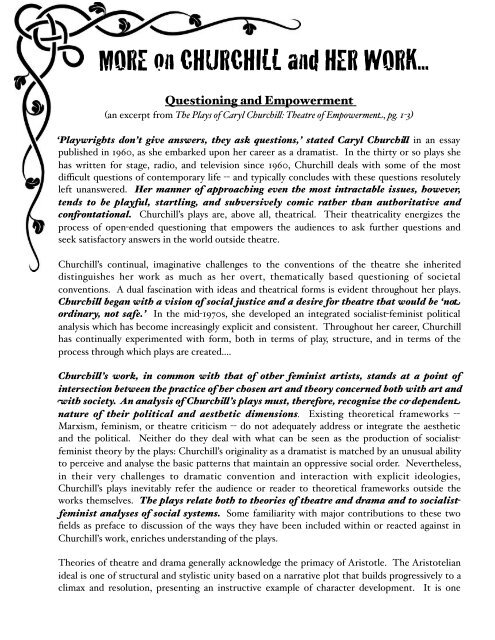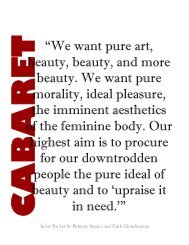The Skriker Actor Packet
The Skriker Actor Packet
The Skriker Actor Packet
You also want an ePaper? Increase the reach of your titles
YUMPU automatically turns print PDFs into web optimized ePapers that Google loves.
! MORE on CHURCHILL and HER WORK...<br />
Questioning and Empowerment<br />
!an excerpt from <strong>The</strong> Plays of Caryl Churchi!: <strong>The</strong>atre of Empowermen", pg. 1#3$<br />
‘Playwrights don’t give answers, they ask questions,’ stated Caryl Churchi! in an essay<br />
published in 1960, as she embarked upon her career as a dramatist. In the thirty or so plays she<br />
has written for stage, radio, and television since 1960, Churchill deals with some of the most<br />
di"cult questions of contemporary life ## and typically concludes with these questions resolutely<br />
left unanswered. Her manner of approaching even the most intractable issues, however,<br />
tends to be playful, startling, and subversively comic rather than authoritative and<br />
con"ontational. Churchill’s plays are, above all, theatrical. <strong>The</strong>ir theatricality energizes the<br />
process of open#ended questioning that empowers the audiences to ask further questions and<br />
seek satisfactory answers in the world outside theatre.<br />
Churchill’s continual, imaginative challenges to the conventions of the theatre she inherited<br />
distinguishes her work as much as her overt, thematically based questioning of societal<br />
conventions. A dual fascination with ideas and theatrical forms is evident throughout her plays.<br />
Churchi! began with a vision of social justice and a desire for theatre that would be ‘no#<br />
ordinary, not safe.’ In the mid#1970s, she developed an integrated socialist#feminist political<br />
analysis which has become increasingly explicit and consistent. Throughout her career, Churchill<br />
has continually experimented with form, both in terms of play, structure, and in terms of the<br />
process through which plays are created....<br />
Churchi!’s work, in common with that of other feminist artists, stands at a point of<br />
intersection between the practice of her chosen art and theory concerned both with art and<br />
$ith society. An analysis of Churchi!’s plays must, therefore, recognize the co%dependen#<br />
nature of their political and aesthetic dimensions. Existing theoretical frameworks ##<br />
Marxism, feminism, or theatre criticism ## do not adequately address or integrate the aesthetic<br />
and the political. Neither do they deal with what can be seen as the production of socialist#<br />
feminist theory by the plays: Churchill’s originality as a dramatist is matched by an unusual ability<br />
to perceive and analyse the basic patterns that maintain an oppressive social order. Nevertheless,<br />
in their very challenges to dramatic convention and interaction with explicit ideologies,<br />
Churchill’s plays inevitably refer the audience or reader to theoretical frameworks outside the<br />
works themselves. <strong>The</strong> plays relate both to theories of theatre and drama and to socialist%<br />
feminist analyses of social systems. Some familiarity with major contributions to these two<br />
fields as preface to discussion of the ways they have been included within or reacted against in<br />
Churchill’s work, enriches understanding of the plays.<br />
<strong>The</strong>ories of theatre and drama generally acknowledge the primacy of Aristotle. <strong>The</strong> Aristotelian<br />
ideal is one of structural and stylistic unity based on a narrative plot that builds progressively to a<br />
climax and resolution, presenting an instructive example of character development. It is one



